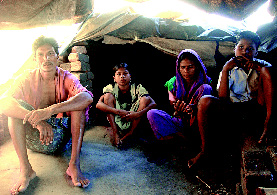
Karuna (name changed) came to the City from Chhattisgarh some four years ago with the help of a placement agency. She needed a job to support her family. As the placement agency couldn’t find a job for her for the first three months, she was ‘handed over’ to a man, who sexually assaulted her in his house. Karuna was hurt and angry, but accepted this as her destiny. She did not want to leave the City – getting a job was very important. Thankfully, now she is working as a domestic help in a household. Unfortunately, many such vulnerable women are sexually exploited soon after they are brought to the City. Later they are either forced to marry boys in local villages or made to work as domestic help. This exploitation came to light when an NGO, Drishti Stree Adhyayan Prabodhan Kendra, conducted a survey/research, to understand the problems associated with migration. A hundred activists of Drishti had visited 200 villages in India’s Eastern states and directly interacted with more than 650 girls who were working in cities and had gone back to their villages (in the East) for holidays. Drishti had involved field workers from various social organisations.
It is unfortunate that, despite such large-scale exploitation, there are hardly any rules to protect the vulnerable. The placement agencies rarely face any legal proceedings for committing such heinous crimes. Drishti believes that their work and findings would pressure the authorities to come up with suitable punishment and a better law. Many feasible suggestions were made by the NGO – for action by governments, social organisations and also by the society in general. “We work as a pressure group for the rights of women and other weaker sections of society. Based on our work and findings we approach the concerned ministry, department and agency to take up the matter more seriously,” informs the Secretary of the NGO, Anjali Deshpande. Many times their studies and findings have been taken up for debate in Parliament. The NGO has recently demanded the immediate enactment of a comprehensive law to prevent forced migration and harassment of minor girls. It has been protesting to make the punishment more severe for placement agents undertaking and facilitating illegal and exploitative activities.
The NGO believes that the role of women in a family is very important. A woman acts as a mother, sister and wife, and has a lot of responsibilities. It is crucial to acknowledge and study her role in the Indian family system. Drishti was founded on this very basis: to study the various issues related to women, and work to remove the obstacles. The NGO has been working for the last 15 years, to develop a deeper understanding of the important issues impacting women, through their lives. Till date the NGO has conducted over 57 studies on women. “Although a woman is today seen inching forward in all walks of life, she has not been able to achieve an equal status to man in society. In order to improve her societal status, it is first necessary to conduct special studies on the various aspects of her life,” says Deshpande.
The NGO spreads awareness relating to the various policies declared at the state, national, and international levels. It also makes women aware of the various schemes and projects pertaining to their development. Simultaneously, it makes available all the necessary information to the activists and provides them extensive training to deal with villagers and tribals. To create a better understanding of the issues impacting women, Drishti also publishes material on various topics. Vrittasankalan and Mahila Swasthya are women-special publications that are brought out from Pune and circulated in Maharashtra.
Studies in Haryana
Drishti is the only NGO that has conducted more than 30 surveys in Haryana, to understand the status of women here. Last year it carried out a research on the prevalence of the dowry system in the State. Contrarily, they came to know that over 318 brides in about 10,000 families had been purchased by the groom’s family! The study, which covered Sonipat, Karnal, Sirsa, Mewat and Mahendragarh, was an eye-opener. The activists at Drishti directly interacted with the girls, who informed them that cash had been paid to their parents/placement agencies and they were forced to marry. “It is contrary to the popular belief that the dowry system is prevalent in Haryana. In fact, the State’s skewed sex ratio has given birth to a new problem! Our studies were used extensively in spreading awareness among local Self-Help Groups, NGOs, authorities and people in general,” says Sandhu, an activist. “It seems people in Haryana don’t mind getting a bride from the Eastern states, as the number of unmarried girls in their villages is fairly low. According to our study, more than 9,000 brides in Haryana have been brought from other states,” informs Anjali.
The NGO also conducted a study on Child Trafficking in the City. With the help of the United Nation Office on Drugs and Crime (UNODC), the NGO found out that a large number of children are brought to the City and Faridabad for sexual exploitation, child labour and domestic work. The Study revealed 13 forms of Human Trafficking and highlighted the broad trends. It highlighted that once these children arrive in the City, many are pushed into a form of bonded labour. They are not even allowed to talk to their family members.
The various studies of Drishti have helped the authorities and police take many important, necessary actions.
Read More...